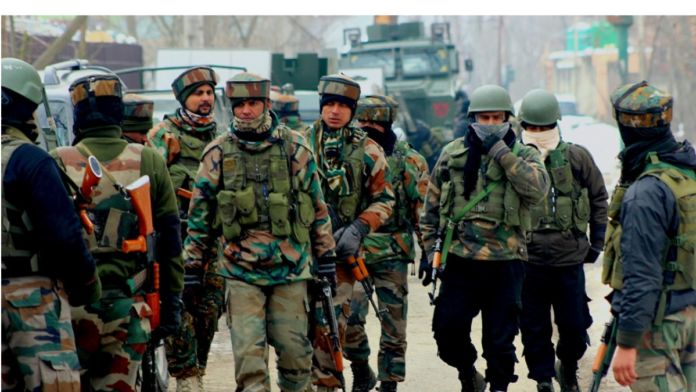The latest terrorist attack on Indian Army Captain Deepak Singh, who was cruelly slain one day before India’s 78th Independence Day, must be strongly condemned. This act of violence, combined with the finding of at least three terrorists sheltering in the Doda district of Jammu and Kashmir, highlights the region’s continued militant activity.
Unfortunately, this is not a unique occurrence, but rather a continuation of the long-running terrorism tale in Jammu and Kashmir. Recent attacks in Jammu show a dramatic shift in terrorist activity due to a number of variables.
To begin, terrorists want to convey the message that, despite the repeal of Article 370 and the central government’s great efforts, the situation in Jammu and Kashmir remains insecure. Second, Jammu’s huge wooded areas make an excellent base for militants to launch guerrilla strikes and avoid security troops. Third, the better law and order situation in Kashmir has shifted the insurgents’ focus to Jammu. Finally, while terrorism in the region was subdued for a period, it has not been abolished, and militants are resurfacing with renewed intensity.
Jammu and Kashmir has always been a target for rebels. Over the years, several terrorist strikes in regions like as Sopore, Budgam, and Dooru Shahbad have aroused severe worries among security officials. What is most concerning about the latest surge is the shift in strategy. Terrorists are no longer merely targeting the military and police; they are increasingly striking people, demonstrating their need for attention.
Furthermore, there has been no break between these strikes, as militants appear unstoppable in their objective of destruction. Unlike in the past, Jammu has suddenly become the epicenter of this terror attack due to its proximity to the border. Religion has, as always, emerged as a crucial motivator for terrorists.
The fundamental purpose of these terrorists is to destabilize the region and create a vulnerable situation. The involvement of a neighboring country with a secret objective cannot be discounted. Many militants rely on terrorism for a living, with some willing to give their life in exchange for monetary reward. Ajmal Kasab, the infamous terrorist implicated in the 2008 Mumbai attacks, is one example of someone being duped into executing horrific deeds in exchange for money.
Despite the central government’s efforts to handle the issue through negotiations with Pakistan and engagement with separatists, insurgency activity remains unabated. Policymakers must acknowledge that terrorism has a direct influence on the nation’s well-being. Anti-terrorism strategies must be adaptable and responsive to evolving threats, including the most recent recommendations and technologies to assure security.
Today’s terrorists are significantly more organized and professional than those of a decade ago. Despite additional security measures being implemented, the threat remains unpredictable. The region’s terrain makes it a perfect location for guerrilla activity, and militants have become more skilled in their tactics, receiving powerful weapons from across the border. Their employment of automatic guns, grenades, and low-intensity bombs exemplifies careful planning and execution.
This new breed of terrorists no longer operates in the shadows. They openly attack financial hubs and other strategic places, as demonstrated in recent global terror occurrences. Terrorists use innovations in transportation and weaponry to grow their networks. Suicide squads, in particular, have astonished the security establishment with their brazenness and cruelty. Terrorists meticulously organize their attacks, hoping to instill terror and manipulate the public to achieve their goals.
Ted Robert Gurr’s famous article, “Why Men Rebel,” contends that people propelled by tremendous passion to achieve a goal frequently turn to violence. This is obvious in current terrorism, where militants view their actions as justifiable sacrifices for a cause.
William Hennery has stated that some politically motivated acts of terrorism are so deeply ingrained in conviction that no sanctions can prevent them. International scholars, including Professor Yonah Alexander, have studied the evolution of terrorism.
Modern terrorists use technologies and techniques that are different from those used by their ancestors. Small, sophisticated groups are increasingly using violent means to generate a psychological impact, with the goal of instilling terror in the public and forcing governments to respond.
The ultimate purpose of terrorism is psychological rather than practical. Terrorists use terror to impact people’s behavior and bring about societal or political changes. There is an urgent need for preventive steps to address the grievances fueling terrorism, enhanced security techniques, and a better understanding of the social and cultural reasons that drive people to insurgency.
Also Read: India boosts defence exports, but questions remain
Effective counter-terrorism initiatives require not only government action, but also community participation. Citizens can help improve security by working with law enforcement agencies. Beyond strict anti-terrorist legislation, programs aimed at tackling the underlying causes of terrorism, such as poverty and a lack of education, are critical.
Several countries have implemented measures to prevent state-sponsored terrorism, such as economic sanctions, but national and international consensus remains difficult. The link between drug smuggling and terrorism complicates matters. To counter this, court procedures must be shortened to ensure that drug traffickers and terrorists face swift trials. India, in particular, can gain vital lessons from other countries’ counterterrorism efforts, such as the United States, which has successfully prevented major terrorist strikes since 9/11.



